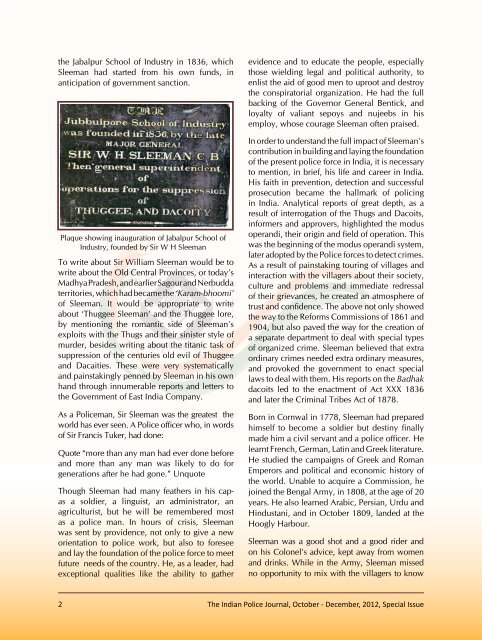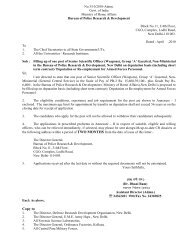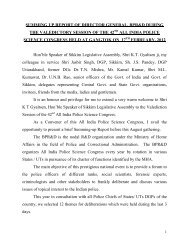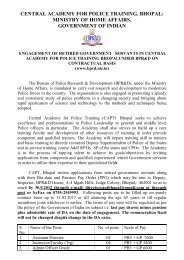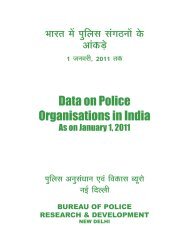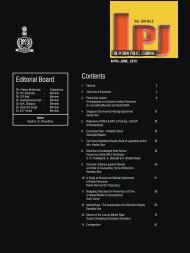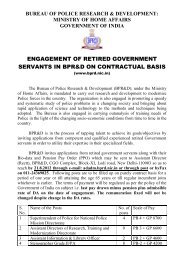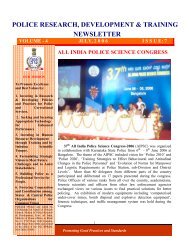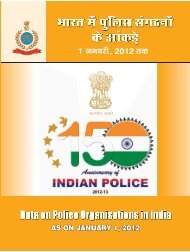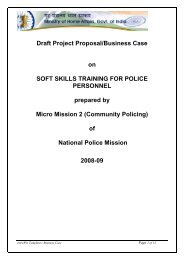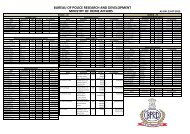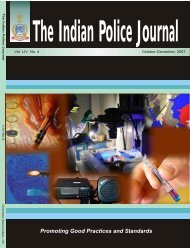the Jabalpur School <strong>of</strong> Industry in 1836, whichSleeman had started from his own funds, inanticipation <strong>of</strong> government sanction.Plaque showing inauguration <strong>of</strong> Jabalpur School <strong>of</strong>Industry, founded by Sir W H SleemanTo write about Sir William Sleeman would be towrite about the Old Central Provinces, or today’sMadhya Pradesh, <strong>and</strong> earlier Sagour <strong>and</strong> Nerbuddaterritories, which had became the ‘Karam-bhoomi’<strong>of</strong> Sleeman. It would be appropriate to writeabout ‘Thuggee Sleeman’ <strong>and</strong> the Thuggee lore,by mentioning the romantic side <strong>of</strong> Sleeman’sexploits with the Thugs <strong>and</strong> their sinister style <strong>of</strong>murder, besides writing about the titanic task <strong>of</strong>suppression <strong>of</strong> the centuries old evil <strong>of</strong> Thuggee<strong>and</strong> Dacaities. These were very systematically<strong>and</strong> painstakingly penned by Sleeman in his ownh<strong>and</strong> through innumerable reports <strong>and</strong> letters tothe Government <strong>of</strong> East India Company.As a <strong>Police</strong>man, Sir Sleeman was the greatest theworld has ever seen. A <strong>Police</strong> <strong>of</strong>ficer who, in words<strong>of</strong> Sir Francis Tuker, had done:Quote “more than any man had ever done before<strong>and</strong> more than any man was likely to do forgenerations after he had gone.” UnquoteThough Sleeman had many feathers in his capasa soldier, a linguist, an administrator, anagriculturist, but he will be remembered mostas a police man. In hours <strong>of</strong> crisis, Sleemanwas sent by providence, not only to give a neworientation to police work, but also to foresee<strong>and</strong> lay the foundation <strong>of</strong> the police force to meetfuture needs <strong>of</strong> the country. He, as a leader, hadexceptional qualities like the ability to gatherevidence <strong>and</strong> to educate the people, especiallythose wielding legal <strong>and</strong> political authority, toenlist the aid <strong>of</strong> good men to uproot <strong>and</strong> destroythe conspiratorial organization. He had the fullbacking <strong>of</strong> the Governor General Bentick, <strong>and</strong>loyalty <strong>of</strong> valiant sepoys <strong>and</strong> nujeebs in hisemploy, whose courage Sleeman <strong>of</strong>ten praised.In order to underst<strong>and</strong> the full impact <strong>of</strong> Sleeman’scontribution in building <strong>and</strong> laying the foundation<strong>of</strong> the present police force in India, it is necessaryto mention, in brief, his life <strong>and</strong> career in India.His faith in prevention, detection <strong>and</strong> successfulprosecution became the hallmark <strong>of</strong> policingin India. Analytical reports <strong>of</strong> great depth, as aresult <strong>of</strong> interrogation <strong>of</strong> the Thugs <strong>and</strong> Dacoits,informers <strong>and</strong> approvers, highlighted the modusoper<strong>and</strong>i, their origin <strong>and</strong> field <strong>of</strong> operation. Thiswas the beginning <strong>of</strong> the modus oper<strong>and</strong>i system,later adopted by the <strong>Police</strong> forces to detect crimes.As a result <strong>of</strong> painstaking touring <strong>of</strong> villages <strong>and</strong>interaction with the villagers about their society,culture <strong>and</strong> problems <strong>and</strong> immediate redressal<strong>of</strong> their grievances, he created an atmosphere <strong>of</strong>trust <strong>and</strong> confidence. The above not only showedthe way to the Reforms Commissions <strong>of</strong> 1861 <strong>and</strong>1904, but also paved the way for the creation <strong>of</strong>a separate department to deal with special types<strong>of</strong> organized crime. Sleeman believed that extraordinary crimes needed extra ordinary measures,<strong>and</strong> provoked the government to enact speciallaws to deal with them. His reports on the Badhakdacoits led to the enactment <strong>of</strong> Act XXX 1836<strong>and</strong> later the Criminal Tribes Act <strong>of</strong> 1878.Born in Cornwal in 1778, Sleeman had preparedhimself to become a soldier but destiny finallymade him a civil servant <strong>and</strong> a police <strong>of</strong>ficer. Helearnt French, German, Latin <strong>and</strong> Greek literature.He studied the campaigns <strong>of</strong> Greek <strong>and</strong> RomanEmperors <strong>and</strong> political <strong>and</strong> economic history <strong>of</strong>the world. Unable to acquire a Commission, hejoined the Bengal Army, in 1808, at the age <strong>of</strong> 20years. He also learned Arabic, Persian, Urdu <strong>and</strong>Hindustani, <strong>and</strong> in October 1809, l<strong>and</strong>ed at theHoogly Harbour.Sleeman was a good shot <strong>and</strong> a good rider <strong>and</strong>on his Colonel's advice, kept away from women<strong>and</strong> drinks. While in the Army, Sleeman missedno opportunity to mix with the villagers to know2The Indian <strong>Police</strong> Journal, October - December, 2012, Special Issue
their life <strong>and</strong> their problems related to agriculture<strong>and</strong> the revenue system. He could freely conversewith the villagers in Hindustani, <strong>and</strong> had a greatpassion for history <strong>and</strong> old records <strong>and</strong> documents.Going through the old records, he came across theaccounts <strong>of</strong> Thugs, as mentioned by Ziya-uddinBarni’s history <strong>of</strong> Ferozshah, written in 1356 <strong>and</strong>the French traveler Thevenot, in the 14 th Century.With this, his thirst to know about these types<strong>of</strong> criminals, their origin, field <strong>of</strong> operation <strong>and</strong>their modus oper<strong>and</strong>i, increased. He noticed thatmany <strong>of</strong> the sepoys going on leave did not returnfor duty. This aroused his suspicion. One RobertC. Sherwood <strong>of</strong> the Madras Medical Corps, hadwritten an article in the Madras Literary Gazette onthe Phansigars (the stranglers), operating in SouthIndia, which confirmed Sleeman’s suspicion <strong>of</strong>the existence <strong>of</strong> Thuggee all over India. He couldconnect Thevenot’s criminals <strong>of</strong> north to thePhansigars mentioned by Sherwood. Yet the Army<strong>of</strong>ficers dismissed the disappearance <strong>of</strong> sepoys,as routine happenings <strong>and</strong> were not interested inresearch, calling it as Sleeman’s obsession.At Allahabad, Sleeman was totally disillusionedwith the Army life <strong>and</strong> applied for the post <strong>of</strong>a language teacher but was advised to join thePolitical Service. In December 1819, Sleeman gota chance <strong>of</strong> his lifetime when he was appointedas Assistant to the political agent <strong>of</strong> the GovernorGeneral at Sagar. He felt that it was God’s willthat he use all his energies to promote the good<strong>of</strong> those who would come under him. Sleemanhad finally come to his ‘Karam-bhoomi’ where hespent three-fourth <strong>of</strong> his career <strong>of</strong> 47 years, withbrief spells at Jhansi, Moradabad <strong>and</strong> Lucknow.In March 1820, Sleeman was attached to the<strong>of</strong>fice <strong>of</strong> the Political Agent at Jabalpur to learnrevenue <strong>and</strong> police work. While at Jabalpur,Sleeman doggedly continued his investigationsabout the Thugs. Between 1820 <strong>and</strong> 1830, thechips were in favour <strong>of</strong> the Thugs. The biggesthurdle was the laissez-faire policy <strong>of</strong> the EastIndia Company, to keep away from all matters<strong>of</strong> religious, social <strong>and</strong> cultural practices in India.Though Thuggee had been exposed by Sherwoodin a detailed article in the Madras LiteraryGazette in 1815, the existence <strong>of</strong> Thuggee wasnot <strong>of</strong>ficially acknowledged. Magistrates invarious areas under the company had caughtThugs before 1810, but they went unpunisheddue to the judges mistaken idea <strong>of</strong> transplantingprinciples <strong>of</strong> criminial jurisprudence <strong>of</strong> Engl<strong>and</strong>to India, which were not suitable to deal withorganized crime like Thuggee. The connivance<strong>of</strong> native states <strong>and</strong> the zamindars, distancesbetween the scenes <strong>of</strong> crime, places <strong>of</strong> arrest<strong>and</strong> places <strong>of</strong> trials, security <strong>of</strong> the witnesses<strong>and</strong> discouragement to informers, who were<strong>of</strong>ten charged with perjury by the judges, werethe main hurdles. Despite these shortcomings,Sleeman continued to investigate Thuggee casesto find out the areas <strong>of</strong> operation, their origin,hereditary ties <strong>and</strong> modus oper<strong>and</strong>i. He startedbuilding up his own records <strong>of</strong> the criminals.He found the police system thoroughly corrupt,inefficient <strong>and</strong> inadequate.About the Thanedars he wrote, "who cansuppose that men so inadequately paid, whohave no promotion to look forward to, <strong>and</strong>feel no security in their tenure <strong>of</strong> <strong>of</strong>fice, <strong>and</strong>consequently, no hope <strong>of</strong> provision for old age,will be zealous <strong>and</strong> honest in the discharge <strong>of</strong>their duties?" He felt that if the government keptthe above considerations in mind for Europeanpublic servants, why were the same principlesnot applied to native police <strong>of</strong>ficers. He furtherwrote that "the magistrate <strong>of</strong> the district gets asalary from 2000 to 2500 rupees a month, thenative <strong>of</strong>ficer, next under him is the Thanedaror the head native police <strong>of</strong> the sub division <strong>of</strong>his district, containing many towns <strong>and</strong> villages,with a population <strong>of</strong> a 100 thous<strong>and</strong> souls. This<strong>of</strong>ficer gets a salary <strong>of</strong> 25 rupees a month <strong>and</strong>the people, seeing how much is expected fromthe Thanedars <strong>and</strong> how little is given to them,submit to his dem<strong>and</strong>s for contributions withouta murmur <strong>and</strong> consider favourably almost anydem<strong>and</strong> coming from a man so employed <strong>and</strong> sopaid". He also suggested, in much detail, waysto remove obstacles in the way <strong>of</strong> prosecution<strong>of</strong> cases, conviction <strong>of</strong> <strong>of</strong>fenders <strong>and</strong> delay injustice. Sleeman was in favour <strong>of</strong> bringing theun-covenanted services at par with covenantedservices. His emphasis was on supervision <strong>and</strong>touring.In 1822, Sleeman was given independent charge <strong>of</strong>Narsinghpur district, about 70 kms from Jabalpur.The Indian <strong>Police</strong> Journal, October - December, 2012, Special Issue 3
- Page 1 and 2: The Indian Police JournalOctober -
- Page 3 and 4: From the Director’s DeskNew Delhi
- Page 5 and 6: 23rd December, 1887: TheJourney beg
- Page 7 and 8: Courtesy - National Archives of Ind
- Page 9 and 10: The Logo released on the completion
- Page 11 and 12: Helmsmen of the IB during thePre-In
- Page 13 and 14: SHRI V.G. VAIDYA, IPS(MAR 1992 TO J
- Page 15: “Sleeman sahib ki jai”“No Cri
- Page 19 and 20: Settling down of criminal tribes wa
- Page 21 and 22: perish. Between 1841 and 1848, anot
- Page 23 and 24: In conclusion, I would like to reco
- Page 25 and 26: own race alone, had to be withdrawn
- Page 27 and 28: a bee in his bonnet” 17 , and abo
- Page 29 and 30: epresented by Tilak and his followe
- Page 31 and 32: The agency more and more fine-tuned
- Page 33 and 34: US was brewing, one William Hopkins
- Page 35 and 36: came under the control of Indian mi
- Page 37 and 38: neutralised many efforts by inimica
- Page 39 and 40: e published by the Intelligence Bur
- Page 41 and 42: As DD (Security), IB, I had occasio
- Page 43 and 44: Chhomohlohri, all of them juxtapose
- Page 45 and 46: Dormers Building, ShimlaThe Dormers
- Page 47 and 48: eforms. Warren Commission, on the a
- Page 49 and 50: and systems will increasingly come
- Page 51 and 52: violence and destabilisation. This
- Page 53 and 54: one develop. The all pervasive cult
- Page 55 and 56: etween the states and the centre su
- Page 57 and 58: Intelligence Agencies inIndian Demo
- Page 59 and 60: Democracies are, today, everywhere
- Page 61 and 62: depend substantially on the restrai
- Page 63 and 64: Of Pistols and Pigs andthe Old Tidd
- Page 65 and 66: it is lovingly caressed hundreds of
- Page 67 and 68:
Through the Eyes of an IB OfficerSh
- Page 69 and 70:
an Intelligence agency. He used to
- Page 71 and 72:
My J&K ExperienceShri R.K. Kapoor,
- Page 73 and 74:
there. We remained stranded there f
- Page 75 and 76:
Scaling Himalayan Heights withthe I
- Page 77 and 78:
proceed to Dungti to supervise the
- Page 79 and 80:
tour of the White House and Lincoln
- Page 81 and 82:
into unconsciousness two hours earl
- Page 83 and 84:
which was completed successfully wi
- Page 85 and 86:
leaders. This happened around the t
- Page 87 and 88:
My Unforgettable Yearsin the North-
- Page 89 and 90:
stated that Prakash Singh, Assistan
- Page 91 and 92:
take her into confidence. That woul
- Page 93 and 94:
Police - Intelligence InterfaceShri
- Page 95 and 96:
Shreekant Bapat and I surveyed the
- Page 97 and 98:
excellence, dedication and commitme
- Page 99 and 100:
Immigration, Inter-State Disputes,
- Page 101 and 102:
Observations on India’s State and
- Page 103 and 104:
assessments that arose after the ca
- Page 105 and 106:
levels. The deficiencies of one par
- Page 107 and 108:
of laying a network of useful roads
- Page 109 and 110:
Technology in Intelligence-Future S
- Page 111 and 112:
These are just some of the aspects
- Page 113 and 114:
Figure 6: Open Source Information o
- Page 115 and 116:
events) and inference from evidence
- Page 117 and 118:
9North Atlantic Treaty Organization
- Page 119 and 120:
Shri Dave was posted back to the lB
- Page 121 and 122:
He even suggested separate pay scal
- Page 123 and 124:
The Unsung HeroesThe Intelligence B


